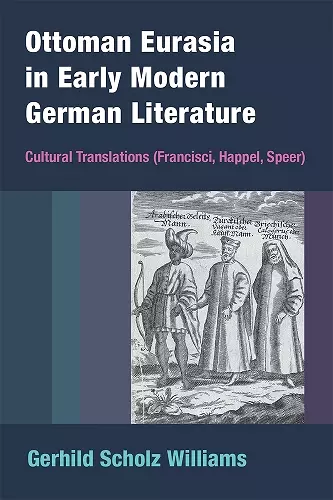Ottoman Eurasia in Early Modern German Literature
Cultural Translations (Francisci, Happel, Speer)
Gerhild Scholz Williams author
Format:Hardback
Publisher:The University of Michigan Press
Published:20th May '21
Currently unavailable, and unfortunately no date known when it will be back

Even a casual perusal of seventeenth-century European print production makes clear that the Turk was on everyone’s mind. Europe’s confrontation of and interaction with the Ottoman Empire in the face of what appeared to be a relentless Ottoman expansion spurred news delivery and literary production in multiple genres, from novels and sermons to calendars and artistic representations. The trans-European conversation stimulated by these media, most importantly the regularly delivered news reports, not only kept the public informed but provided the basis for literary conversations among many seventeenth-century writers, three of whom form the center of this inquiry: Daniel Speer (1636-1707), Eberhard Werner Happel (1647-1690), and Erasmus Francisci (1626-1694). The expansion of the Ottoman Empire during the sixteenth and seventeenth centuries offers the opportunity to view these writers' texts in the context of Europe and from a more narrowly defined Ottoman Eurasian perspective.
Ottoman Eurasia in Early Modern German Literature: Cultural Translations (Francisci, Happel, Speer) explores the variety of cultural and commercial conversations between Europe and Ottoman Eurasia as they negotiated their competing economic and hegemonic interests. Brought about by travel, trade, diplomacy, and wars, these conversations were, by definition, “cross-cultural” and diverse. They eroded the antagonism of “us and them,” the notion of the European center and the Ottoman periphery that has historically shaped the view of European-Ottoman interactions.
"Ottoman Eurasia in Early Modern German Literature. Cultural Translations (Francisci, Happel, Speer) is a compelling read that would make an excellent addition to any reading list for advanced undergraduate or postgraduate students eager to broaden their understanding of early modern cross-cultural relations."
—Journal of Early Modern History
". . . the close reading of ample textual evidence presented here compellingly documents a qualitative shift toward a more differentiated and benevolent representation of turks and of the Ottoman empire in Germany."
—The German Quarterly
ISBN: 9780472132416
Dimensions: unknown
Weight: unknown
246 pages